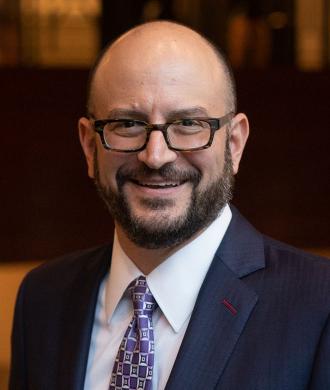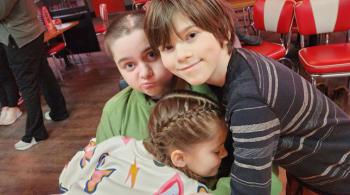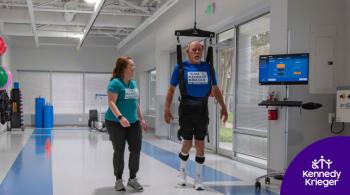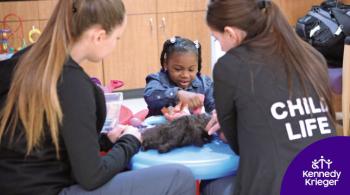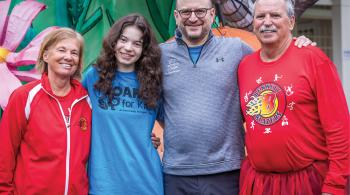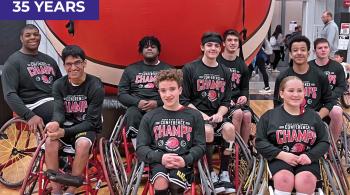February is Rare Disease Month—a month-long focus on rare diseases, culminating on rare disease day, February 28th. Currently more than 7,000 rare diseases have been identified with a significant proportion of them involving the developing brain and nervous system. And the vast majority of rare diseases have a genetic basis. Coping with a rare disease is often aptly described as a journey. And along that journey, questions and concerns will come up at every stage of life. Where can a family member go for that information and support? Often, a genetic counselor is an excellent option, especially for those contending with a rare, genetic disorder. Listen to Dr. Bradley Schlaggar, president and CEO of Kennedy Krieger and his guests talk about the role that genetic counseling plays in supporting families struggling with a rare disorder.
Resources
- Kennedy Krieger Genetic Counseling
- National Society of Genetic Counselors
- National Organization of Rare Diseases Understanding Rare Diseases
- National Organization of Rare Diseases – Living with a Rare Disease
Learn More About Kennedy Krieger Faculty & Staff Members Featured in This Episode
Learn More About Kennedy Krieger Faculty & Staff Members Featured in This Episode
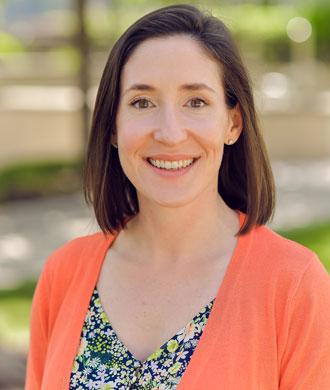
Julie
Cohen
,
ScM, CGC
View Episode Transcription
Dr. Brad Schlaggar (BS): Welcome to Your Child's Brain, a podcast series produced by Kennedy Krieger Institute with assistance from WYPR. Dr. Brad Schlaggar, Pediatric Neurologist, and President and CEO of Kennedy Krieger Institute. February is Rare Disease Month, a month long focus internationally on rare diseases culminating on Rare Disease Day, which is February 28th. Currently, more than 7,000 rare diseases have been identified with a significant proportion of them involving the developing brain and nervous system, and the vast majority of rare diseases have a genetic basis. In the US, a rare disease is defined when less than 200,000 people have that diagnosis. There's more than 25 million Americans who have a rare disease. As listeners to this podcast have likely heard, having a given rare disease is rare, but having any rare disease is common. People with rare diseases often undergo a very long diagnostic process and have many unmet needs, including lack of access to information, treatment and support. Coping with a rare disease or a complex medical condition in general is often aptly described as a journey. Along that journey, questions and concerns will come up at every stage of life. Where can a family member go for that information and support? Often, a genetic counselor is an excellent option, especially for those contending with a rare genetic disorder. Genetic counselors are healthcare professionals with special training in counseling and medical genetics. They provide information about how a genetic condition could affect an individual or family and or interpret genetic tests that are designed to help estimate the risk of having a given disease. Additionally, they will convey information to address the concerns of the individual or family, help them make an informed decision about their medical situation, and provide counseling to help them adapt to their condition or risk. With advancements in genetic testing, understanding the implications of test results is crucial for both medical professionals and patients. But what exactly does a genetic counselor do? How can they help those with or who are seeking a rare disease diagnosis? To answer these questions and more, I'm joined today by one of my exceptional colleagues at Kennedy Krieger, Julie Cohen. Julie is the Director of Genetic Counseling Services at Kennedy Krieger and is an Assistant Professor of Neurology at the Johns Hopkins University School of Medicine. We're also joined by Stefanie, mom of Katie. Welcome, Julie and Stefanie. Julie, let's start with you. First, can you help us understand a bit about genetics and what we mean by a genetic disorder?
Julie Cohen (JC): A key skill of a genetic counselor is taking information that's complicated and sometimes serious or scary and explaining it in a simpler way that's understandable and meaningful to the family. My favorite analogy to understand genetics is a cookbook. Our genetic information is like a cookbook to make a person. Genes are the recipes, the instructions to make proteins that are necessary for our body, DNA, the alphabet, and our genes and DNA are organized into structures called chromosomes, like the chapters in the cookbook. Brad, our genetic information or cookbook is huge, 20,000 recipes, three billion letters, and we have two copies of our cookbook. We get one from mom and one from dad. That in 30 seconds or less is all you need to know about genetics. We all have genetic variants, many of which are normal, or they influence our risk for common health conditions. But the term genetic disorder, that is referring to a health or developmental condition that is solely caused by a specific change or abnormality in the DNA or chromosomes. It's like a major typo in a recipe or you're missing pages from your cookbook.
BS: A common question that comes up is, are genetic conditions always inherited? How can someone's condition be genetic if no one else in the family has it, for example?
JC: I get that question all the time. A genetic condition by definition is caused by a change in DNA or chromosomes, but they're actually not always inherited. Many times the genetic change occurs new in the person who's affected. It's by a new genetic variant that occurs just in the egg or the sperm that created them by chance. We call that a de novo variant. Other times, genetic conditions are inherited, but you don't see it in the family. Conditions can be inherited in a recessive way, where it only shows up if both copies of a person's recipe, their gene is abnormal. They inherit it from their parents, but because the parents have a normal gene copy also, they don't show symptoms.
BS: What do we mean by genetic testing? There are different kinds of genetic tests. What are they? What are their differences?
JC: Broadly speaking, a genetic test, it's a test that's looking at the DNA or the chromosome, and it's usually done at a cheek swab or a blood sample. But as you said, there's many different types of genetic tests and done for different purposes. There's tests that we do for diagnosis. That's most of what we do here at Kennedy Krieger, test to see if you're a carrier for a condition or non medical genetic tests like ancestry. Thinking about in the diagnostic setting, there's tests that can be very focused, like if you have a family history of a specific genetic condition, and if you want to know if you have it, we'll look at that particular variant. It can also go very broad and this is what we most commonly do in the diagnostic setting is using tests that look at the important parts of all of our 20,000 recipes or our entire cookbook and these are very powerful tests with high diagnostic yields, and it's routine now, surprisingly.
BS: Julie, we recently had an episode that was focused on Trisomy 21. We talked about it as a chromosomal disorder and you've mentioned chromosomes, in your analogy to the cookbook. Let's take a moment and talk about the difference between a genetic disorder and a chromosomal disorder. How are they the same? How are they different?
JC: I would say they're the same. A chromosomal disorder is a type of genetic condition. Down syndrome, it's caused by having a complete extra chromosome 21. The body has extra copies of all of these recipes, which affects that person, how they develop physically, how their brain develops, and their abilities. But down syndrome is not inherited, almost always. It's just a random extra chromosome. It occurs in the egg or the sperm, and it's nobody's fault, and we can't control it.
BS: Genetic testing has become more affordable and widespread, remarkably. What have we been able to learn about disease, genetic disease incidents and their mechanisms?
JC: There have been enormous advances. It's such an exciting time and even what I've seen over the course of my career, how things have changed. For one, we're learning the extreme genetic heterogeneity of health and developmental conditions, just how many of these conditions are due to genetic changes inherited or not. Just as an example, take intellectual disability. There are over 2,000 genes that are known to cause disorders with intellectual disability as a symptom. To what you said at the beginning, Brad, each one is individually, really rare but common. Many, probably the majority of people with intellectual disability have a genetic cause. The pace of discovery is incredible. Ten years ago, 15 years ago, there were only 500 known genes related to intellectual disability. Brad, I'm not exaggerating when I say every week, there's several new genetic conditions discovered. When we understand that causative gene, we can really understand what exactly is happening in the body or in the brain, and only then that opens the door for researchers to develop specific treatments.
BS: You mentioned treatment development, and it raises the question, how can the results from genetic testing impact medical care, such as treatment? Besides treatment, what other aspects of medical care might be impacted by genetic test results?
JC: For some genetic conditions, there actually is a specific treatment, a medication, for example, that overcomes whatever that underlying issue is. In some conditions, there's even gene therapy where we can give the body back a healthy copy of the gene. Now, most genetic conditions today don't have that magic bullet, that cure. But even when there's not that really specific treatment, knowing a genetic diagnosis, we can tell the families more about what to expect in the future. It may guide medical management. Certain genetic conditions can have other health risks associated with it or other medical problems, and if we know that, we can be proactive to screen for those things or catch them early. There's also benefit of knowing what to expect in the future, and there's many non-medical benefits that I'm sure Stefanie can give us some examples of.
BS: Exactly. I just want to underscore that treatment is not exclusive to a drug or a surgery. That medical care encompasses all of those aspects that Julie that you just described, including anticipation, understanding what might be coming. Education is such an important part of medical care and sometimes there's a narrowing down to think that it has to be a pill or a scalpel. Let's talk more about the role of a genetic counselor in and on the healthcare team.
JC: In a clinical setting, genetic counselors work with patients and families who have or are at risk for genetic conditions and our role is complimentary to physicians. What we can do, what we offer is risk assessment, education about the way that genetics might influence their condition, the possibility of a genetic cause. We help select the most appropriate genetic tests if indicated. We will talk with families before the testing is done to help them understand possible results and make an informed decision. When there's a known diagnosis, we can spend a great deal of time sitting with the families and helping understand what that means for them and their relatives. When we do genetic testing and the results come back? Genetic counselors, we have a key role in helping interpret those genetic results. And then relaying that to the family. It can be super complicated. So using that cookbook analogy as one way to help families understand. We can also talk with families about many questions they might have. Is this something that they could have another child with the condition? What are reproductive options? And helping connect them with support resources, with research or clinical trials. And the counseling part of genetic counseling. It's not just genetics, it's the counseling. So helping families adapt to and cope with having a genetic condition or risk.
BS: So what are the scenarios where someone, a patient, a family should be referred to a genetic counselor?
JC: So broadly speaking, a person should be referred if they have a personal or family history of a known genetic condition when they or their doctors have a concern that there could be a genetic cause, or there's a family history suggestive of a hereditary disorder or risk. So that's just broad categories. At Kennedy Krieger, we specialize in neurologic and developmental disorders. So in that context, actually, all individuals with diagnoses like intellectual disability, autism, developmental delay, cerebral palsy epilepsy? All individuals should have a genetic evaluation and if they want, have genetic testing.
BS: Sometimes a family might say, I'm not sure I want to do that. So what can I do as a pediatric neurologist to describe the benefits of saying, yes, I'm going to see a genetic counselor for people or families that are affected by rare genetic diseases?
JC: Firstly, letting them know that saying yes and having a genetic counseling appointment does not commit them to any testing. My job, our job is to decide if testing is appropriate, but talk them through that decision. And I have plenty of patients and families who say, You know what, now is not the right time. I don't want to learn this or it's not relevant to me right now. And that's okay.
BS: Thank you. I think this is a really good time to bring in Stefanie to give a parent's perspective on genetic counseling. So, Stefanie, thank you again for joining us. And if you would, tell us about your daughter, Katie.
Stefanie: We definitely had a long journey. Katie's 23 now. And it took almost 20 years to get a real reason as to perhaps why she had the issues she had. From a very early age, there was the developmental delay, and then you know, then it turned into intellectual disability. She was diagnosed with bipolar with a very extreme psychiatric psychosis component. And I can't tell you how many times I heard it. We haven't ever really had a kid quite like, Katie, and from doctors and just trying to search at the time, it was just okay, she's intellectually delayed. And I think early days with school, you get like school testing or, you know, they'll recommend neuro-psych testing all through the school stuff. We even had infants and toddlers involved from the very beginning at 2 years old. But it wasn't until she was 11 when she was hospitalized at Johns Hopkins for a pretty extreme manic psychotic episode. And coming home from that, That's when genetic testing was suggested to us. All along though she kind of has a laundry list of diagnoses. I think because she was so young, her presentation was so severe. It made sense for genetic testing. We had been information gathering pretty much from the start. You definitely have moments where she's going to grow out of that, or she'll catch up. But I will say that getting the testing and meeting Julie and at the time the neurologist, Doctor Fatemi, I felt so supported. And Julie does have a great way of explaining A, you don't have to do it. B, how much of it do you want to know? And basically our genetics are just a component of the big picture. Basically, we're parents just trying to find the best solutions, which may not be the latest drug. You know, it's just like just kind of getting through the day-to-day. But I will say, it wasn't until Katie was pretty much like 20 years old that we had the sample. We did some genetic testing that came back no real substituent answer, no real causation to all of her issues. Before we had an answer, before we had a cause, Genetic counseling really did help us because maybe we didn't find out the reason of Katie's diagnosis or her picture. We found out some stuff basically that could help our other children. I have two other children, one older sister, one younger brother for Katie. At the time when we got some extra findings that didn't really explain Katie's issues, we were able to address some things we wouldn't otherwise know. When we finally did get the diagnosis, knowing it wasn't hereditary was such a huge thing for our other children. I was just praying they would have kids. I didn't want them to say I'm not doing that. Mom did that. I watched it. It was nice to be able to say, guys, this is not going to happen with your child. Frankly, if it was hereditary, maybe there were things that they could do to support their future children or deal with genetic counseling or reproductive counseling so that they don't have those risks. And I also think as a mom, and this is whether you have a special needs child or not, we all look and think, Oh, what did I do? When I was pregnant, did I eat the wrong thing or to have a genetic answer, it's very nice.
BS: Stefanie, just the way you describe the experience, I think anybody listening will understand that it really is a journey. There are the stops along the way and periods of uncertainty and periods with answers, it's remarkable. I really appreciate sharing your experience and insights, and how the counseling aspect that Julie made the point, it's not limited to genetics, it's real counseling, and how much that aspect of the experience was beneficial to you and to your family. Thank you, Stefanie. Julie, there's a lot to pick up on there. One thing I'd like to hear your thoughts about is that part of the story where early on with testing, there wasn't an answer. Then an answer emerged. Let's talk about how commonly that scenario plays out, and why that happens.
JC: Genetic discoveries, advances in genetic testing happened so fast. The tests that we do now that are available now may not have been available a few years ago. Katie had some genetic tests back over ten years ago, now, it's hard to believe when I first met her, which were state of the art tests at the time, and they came back negative. Based on that test, we couldn't fight an answer, but we knew an answer was there somewhere in her DNA. Stefanie and Katie, they came back every year to see us, which we so appreciate, and then more testing would come along, improvements, and we discussed it, and and they did it. Again, still coming back negative. It's partly how testing improves the technology, but also really knowledge, just understanding of which genetic conditions are possible. Like Stefanie said, The genetic condition that Katie actually has a partial deletion of this gene called VAP 2. If we had done that this same test two or three years earlier, we wouldn't have found the answer. It was always there in Katie.
BS: Julie, let's talk about common barriers. We hear the benefits. But what are the barriers for families who want to see a genetic counselor and or get genetic testing? What are those barriers?
JC: One barrier, an important one is awareness, awareness among the general public, and even awareness among health care providers about the availability of genetic testing, the indications for genetic testing that it's so broad now. Really even getting through the door, getting that referral to a genetic counselor, a genetic specialist. There is not a shortage of genetic counselors. There's over 8,000 genetic counselors in the country, but in some parts of the country, access is an issue, and in some hospitals, there is a long waitlist. As far as barriers to genetic testing, there's a lot of hoops to jump through. Most health insurance companies do cover genetic testing, but there may be complicated requirements or criteria or pre-authorization. That could just be a deterrent. But when you're working with a genetic counselor, we'll help guide you through that.
BS: You mentioned that there's not a shortage of genetic counselors. It is also true that the number of genetic counselors in the US has grown by more than tenfold in the last 30 plus years. What's driving that growth of genetic counselors?
JC: It has grown by more than tenfold. In the next ten years, Brad, the genetic counseling workforce is expected to double again. There's a number of factors driving the growth of the genetic counseling workforce or the demand. One is just widespread, more widespread use of genetic testing and the need for genetic testing in the clinical setting. The expertise that's needed in a broader range of medical specialties, interests among the public to seek out genetic testing. And also genetic counselors, I've talked today mostly about clinical genetic counselors, but genetic counselors have a lot of other roles in research, in public policy and public health, advocacy and industry.
BS: Let's talk about the training of genetic counselors. What does it take What kind of special training is required for genetic counselors, and then how do you differentiate those different kinds of careers, clinical, research, advocacy, policy, et cetera?
JC: To become a genetic counselor, it's a specific master's degree. As genetic counselors, we're master's level health professionals, and we graduate from specific genetic counseling training programs. The training we get the education, it includes medical genetics, of course, genetic technology, psychology, and counseling. Research, public health, and bioethics. When we complete that training, genetic counselors then get certified by the American Board of Genetic Counseling, and in many states, we have licensure. To your question, Brad, about how do we then differentiate into different specialties? That's largely based on interest, on what that particular person wants to do with their career, if they want to work clinically and in a particular specialty. For me, I actually came through Kennedy Krieger when I was a student, and I saw the patients here and I met the amazing providers here, and I said, This is what I want to do. This is where I want to work. I want to help these patients and families. Here I am 15 years later, I have a team of eight amazing genetic counselors.
BS: During this period of time, your career, and I'll play I've been doing it for 30 years, kind of a card here. In the time that I've been doing it for medical school until now, just the availability of genetic counselors has increased significantly, and the roles that genetic counselors play has also evolved. Comment on that. The evolving role of genetic counselors in the healthcare and research space over this period of time. Comment on how that has played out.
JC: Historically, genetic counselors worked underneath a medical geneticist, and when a patient needed a genetic evaluation, they were referred to a specific genetics clinic. Over time, as the demand increased, as broader indications for genetic counseling and genetic testing, while those genetics clinic models are still important, genetic counselors have branched out and now work more independently in different medical specialties. What we did here at Kennedy Krieger is the genetic counselors, we brought that. I brought myself. I brought other people into the clinics. I work directly with the neurologists, the developmental pediatricians, those other specialists. I and my colleagues can provide genetic evaluation and counseling in the patient's medical home. We also offer our expertise to other healthcare providers. It is not realistic that every patient who needs a genetic test or or has a genetic risk would see a genetic counselor. There's just not enough of us. Genetic counselors, we have an important role in educating healthcare providers what they need to know about genetics, genetic contribution to disease, ordering appropriate tests, counseling about those tests. I also see my job as empowering other healthcare providers to incorporate genetics into their practice.
BS: I just want to underscore that. That is a really key evolution of the role that the subject matter experts on for health care providers to understand when and how to test and how to interpret has very much become the role of genetic counselors, and we experience it hugely here at Kennedy Krieger and more broadly. What excites you about the future of genetics, genetic counseling and our understanding of rare disorders going forward?
JC: Oh, my goodness. I am excited about it so much. I love this profession. It's so meaningful, and intellectually, it's so exciting. What I would say I'm most excited about is the pace of discovery, understanding these genetic conditions and the underpinnings for these diseases and disorders to provide more hope and better treatments for families. I am also excited about getting genetic counseling and access to genetics throughout the public, throughout all of the medical specialties where it's needed so that there's better access for this.
BS: I know there are resources that you've identified that we can share with families interested in learning more, we'll put links to those resources on the page associated with this episode of the podcast. This conversation is really important as it is timely. I think I'd like to remind our audience that February is Rare Disease Month, and the goal of the month is to share information, personal stories to bring awareness to those millions struggling with or experiencing a rare disease or disorder. We hope that this episode did that for you. Thank you to our guests, Julie Cohen, and to Stefanie, for sharing her family's very personal story, and we hope that you, our listeners have found this discussion about genetic counseling, both interesting and informative. Please check out our entire library of topics on your child's brain at wypr.org, KennedyKrieger.org/ycb or wherever you get your podcasts. You've been listening to Your Child's rain. Your child's brain is produced by Kennedy Krieger Institute with assistance from WYPR and producer Spencer Bryant. Please join us next time as we examine the mysteries of your child's brain.

